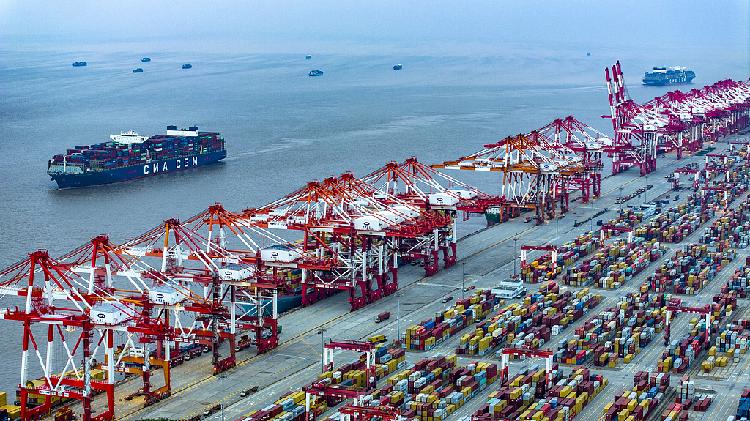China advocates for open markets in response to increasing anti-globalization tendencies
China advocates for open markets in the face of increasing anti-globalization sentiments.

Thanks to investments from China, Chancay is now home to a high-tech megaport featuring unmanned cranes and 5G technology. Once operational, the port will be able to accommodate the world's largest cargo ships, manage up to 1.5 million twenty-foot equivalent units annually, and greatly reduce shipping times. The project's first phase will cut the sea shipping time from Peru to China to 23 days, potentially slashing logistics costs by at least 20 percent.
This port will not only benefit Peru but also function as a logistics hub for all of Latin America. Businesses from countries like Brazil, Venezuela, Bolivia, Paraguay, and Argentina are expected to use this port as a vital trade route to Asia.
However, Chancay represents just one component of a much broader strategy. Across the globe, China is strengthening its engagement in industrial cooperation, advocating free trade and investment, and working towards the establishment of an open world economy.
One strategy China employs to boost global trade is through signing free trade agreements (FTAs) with other nations. Data from the commerce ministry reveals that by the end of April, China had signed FTAs with 29 countries and regions spanning Asia, Oceania, Africa, and Latin America. Trade with these partners constitutes approximately one-third of China’s total foreign trade.
Statistics provide an insightful perspective. In 2022, trade volumes with FTA partners grew by 8 percent, surpassing China’s overall trade growth of 7.7 percent. For countries like Chile and New Zealand, these agreements have created pathways for various goods, such as cherries and dairy products, to enter Chinese markets tariff-free.
"The signing of FTAs allows the ever-expanding Chinese market to be shared globally. This facilitates the complementary advantages of resources among participants, making it one of the key drivers of global economic growth," noted Wang Yong, a professor at Peking University's School of International Studies.
China remains committed to promoting open markets.
In addition to FTAs, the Belt and Road Initiative (BRI) represents China's global project aimed at fostering economic growth and enhanced connectivity among participating nations. Since its launch, over 150 countries and 30 international organizations, mainly from the developing world, have entered into cooperation agreements with China.
Through the construction of essential infrastructure—such as railways, highways, ports, power grids, and communication networks—the BRI has significantly bolstered infrastructure in developing nations, improving trade efficiency and enabling industrial upgrades. The initiative has also created considerable employment opportunities and stimulated economic growth, while promoting sustainable development via technology transfer and capacity building, thus contributing to inclusive global economic progress.
In Europe, Hungary has emerged as a significant beneficiary. Over the past two years, Hungary has attracted more than 25 percent of all Chinese investments in Europe, particularly in the electric vehicle and info-communications sectors. Companies like CATL, the world’s largest EV battery manufacturer, are establishing facilities in Hungary, generating jobs and strengthening the national economy. Hungary’s official statistics indicate that China’s direct investment in Hungary reached 7.6 billion euros in 2023, representing 58 percent of the nation’s total foreign direct investment.
Moreover, China established the Asian Infrastructure Investment Bank (AIIB) as an open and inclusive platform for international financial cooperation. Official data shows that since its inception, the AIIB has financed over 200 projects in diverse sectors, including transportation, energy, water management, and urban development across more than 30 nations, with total investments exceeding $40 billion.
By supplying stable, long-term funding, the AIIB has improved infrastructure, supported green energy transitions, tackled climate change in developing countries, and contributed to a fairer and more equitable global economic system.
As global trade encounters challenges from protectionism and geopolitical tensions, China remains committed to its mission of facilitating open markets.
In October 2024, during the World Trade Organization General Council meeting in Geneva, Switzerland, China proposed new guidelines aimed at reducing non-tariff barriers to enhance global trade. These guidelines emphasize increasing transparency, simplifying import licensing procedures, and harmonizing technical standards among member countries. The proposal has received backing from several WTO members who see it as a positive step toward fostering a more open and efficient global trading environment.
"China's vision is not just about connecting supply chains but about bridging gaps between continents, economies and people," Wang stated.
Olivia Brown for TROIB News
Find more stories on Business, Economy and Finance in TROIB business












